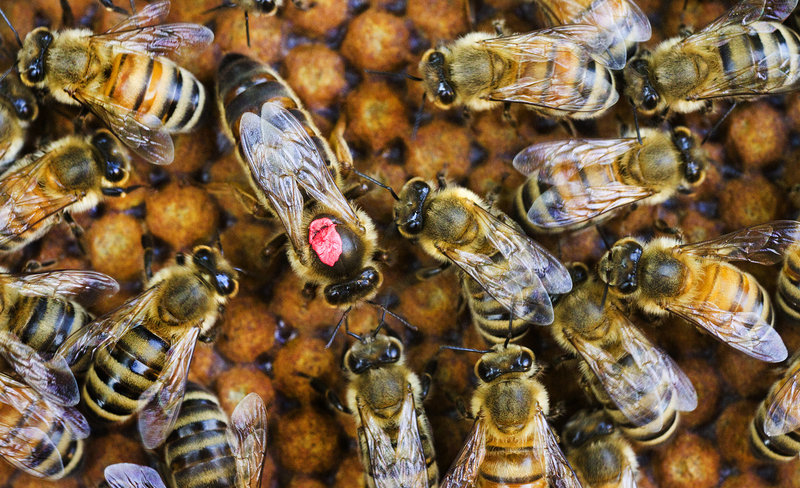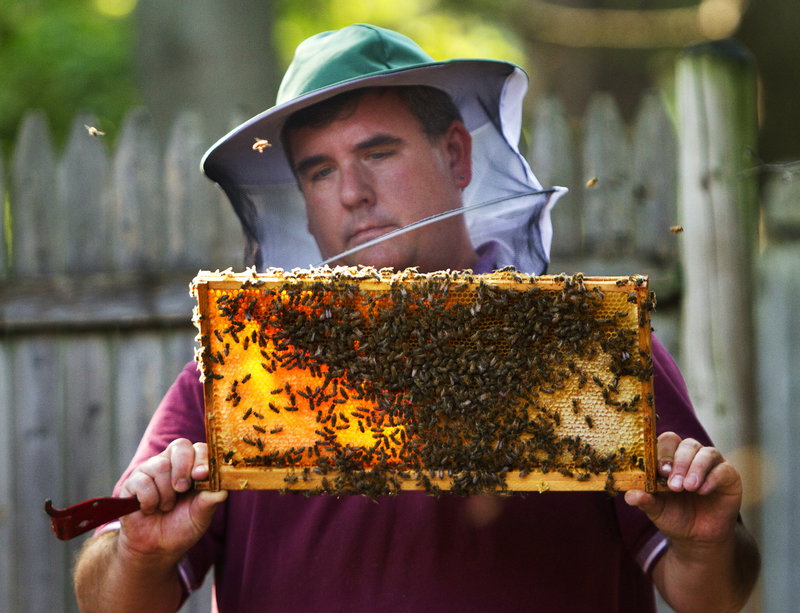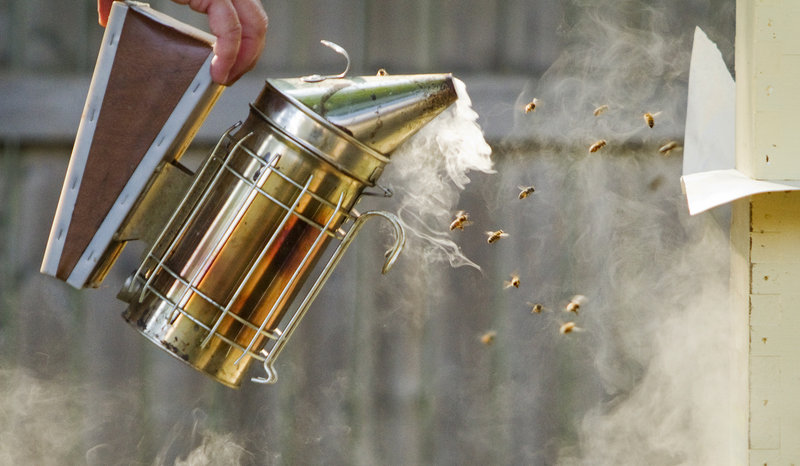Bees and beekeepers have been struggling through one of the worst summers for honey production in Maine in recent memory.
But there’s still time for recovery if hive production rebounds before the season’s second harvest ends.
The early summer’s crop looked good initially, but it was a washout, thanks to weather in July that was too wet, and then too hot, for bees to forage, said Tony Jadczak, the state apiarist and bee inspector. He said that the season to date is shaping up to be one of the 10 worst in Maine history.
The fall crop looks promising, and weather so far in August has been cooperating, but it will be impossible to say for sure until mid- to late September, Jadczak said.
The poor production of Maine hives is not being attributed to the widely publicized colony collapse disorder — a cluster of symptoms tied to mites, bacteria and pesticide use — that has wiped out 10 million beehives across the country in the past seven years. This month, a team of scientists from the U.S. Department of Agriculture and the University of Maryland determined that healthy bees that ate selected fungicides, supposedly harmless to bees, were three times more likely to become infected with a parasite known to cause colony collapse disorder.
Instead, the bees in Maine have been starving.
The root cause is weather: two weeks of heavy rain, which kept bees dormant in the hives, in July, followed by two weeks of unusually hot weather that kept flowers closed to conserve water, beekeepers said.
That combination kept bees from gathering nectar, resulting in less honey in hives in many parts of the state, Jadczak said. The only county he hasn’t checked yet is Aroostook, but all others reported problems originally suspected to be linked to colony collapse or pesticides, but eventually shown as stemming from stress from extreme summer weather.
“Upon further investigation, we find it’s starvation, not pesticides,” Jadczak said. “Strong hives ate a lot of their honey stores” that normally get them through the winter. There was more honey in most hives on July 4 than there is now, he said.
“Hives in Portland didn’t have any nectar for four weeks,” said Phil Gaven, owner of The Honey Exchange, a beekeeping supply shop on Stevens Avenue in Portland. “It was a strange midseason. Many hives started consuming what they’d stored in June, (and) beekeepers all over were feeding this year.”
Bee populations in other New England states have had few problems, Jadczak said.
Honey is derived from flower nectar that bees collect and store in honeycombs, where it is broken down into simple sugars. The honeycombs’ design, plus constant fanning by bees’ wings, causes evaporation, creating the thick, sweet liquid. Color and flavor varies hive to hive, depending on which flowers’ nectar is gathered.
When their honey runs low, bees can live on white-sugar patties, or cakes, which provide the sugar that bees need, said beekeeper Stan Brown, owner of Brown’s Bee Farm on Greely Road in North Yarmouth. But that works only for a short time, he said, because if the bees feed on sugar for too long, their honey will take on that taste. “And that’s no good.”
“Summer production is down,” Brown acknowledged. “If it would warm up at night again, the crop would be good.”
Bees have been consuming stored honey to generate heat on cooler nights during the past few weeks, said Brown, 94, who has worked beehives since he was 12 years old.
Maine bees produced 91 million pounds of honey in 2012, up from 80 million in 2011 and higher than the state’s five-year average of 84 million pounds. The wholesale price in 2012 stood at 76 cents per pound, bringing the total value to the state to almost $70 million.
Apiarists are hopeful that August’s more favorable weather and the late-summer blooming of goldenrod, loosestrife and clover will compensate for earlier looting of honey by emaciated bees. Weather conditions improved late last week, making the gathering of nectar a little easier, Jadczak said.
“It’s not quite a bust yet,” he said.
Staff Writer North Cairn can be contacted at 791- 6325 or at:
ncairn@mainetoday.com
Send questions/comments to the editors.





Success. Please wait for the page to reload. If the page does not reload within 5 seconds, please refresh the page.
Enter your email and password to access comments.
Hi, to comment on stories you must . This profile is in addition to your subscription and website login.
Already have a commenting profile? .
Invalid username/password.
Please check your email to confirm and complete your registration.
Only subscribers are eligible to post comments. Please subscribe or login first for digital access. Here’s why.
Use the form below to reset your password. When you've submitted your account email, we will send an email with a reset code.